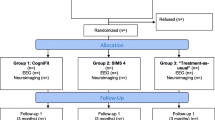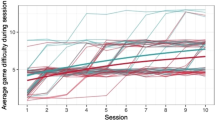Abstract
This study aimed to examine the efficacy of video games in improving cognitive function in chronic patients with schizophrenia and to evaluate the biomarker of video games for cognitive function. The patients in the game group were requested to play single-player video games on their smartphones for 1 h per day, five times a week for 6 weeks. Those in the control group watched television for 1 h per day, five times a week for 6 weeks. Cognitive function was assessed using the Repeatable Battery for the Assessment of Neuropsychological Status (RBANS) and Stroop Color and Word Test (SCWT). Clinical symptoms were assessed using the Positive and Negative Syndrome Scale (PANSS), Global Assessment of Functioning (GAF), General Self-Efficacy Scale (GSE), Problematic Mobile Gaming Questionnaire (PMGQ), and Patient Health Questionnaire-9 (PHQ-9). The game group demonstrated improved RBANS total score during the trial. There were no significant group effects among all SCWT scores. The game group demonstrated greater improvement on the PANSS Negative Scale, and global function (GAF score). The PMGQ scores were lower than the cutoff score at all time points in both groups. There were no significant group differences in the PHQ-9 and GSE scores. The serum BDNF levels were significantly higher in the game group following 6 weeks of video game intervention. The BDNF serum levels of all participants were positively associated with the RBANS total scores. This preliminary study suggested that video games can improve cognitive function in schizophrenia patients. Serum BDNF levels may be a suitable biomarker for predicting an improvement in cognitive function in schizophrenia patients.
Trial registration: This study was registered on March 11, 2021 (ChiCTR2100044113).
Clinical trials: Smartphone video games improve cognitive function in patients with chronic schizophrenia; https://www.chictr.org.cn/hvshowproject.aspx?id=95623; ChiCTR2100044113.



Similar content being viewed by others
Data availability
The datasets generated by the survey research during and/or analyzed during the current study are available. Researchers may obtain data for this study by contacting the corresponding author.
References
Correll CU, Schooler NR (2020) Negative symptoms in schizophrenia: a review and clinical guide for recognition, assessment, and treatment. Neuropsychiatr Dis Treat 16:519–534. https://doi.org/10.2147/NDT.S225643
Strauss GP, Esfahlani FZ, Galderisi S, Mucci A, Rossi A, Bucci P, Rocca P, Maj M, Kirkpatrick B, Ruiz I, Sayama H (2019) Network analysis reveals the latent structure of negative symptoms in schizophrenia. Schizophr Bull 45(5):1033–1041. https://doi.org/10.1093/schbul/sby133
Kaneko K (2018) Negative symptoms and cognitive impairments in schizophrenia: two key symptoms negatively influencing social functioning. Yonago Acta Med. 61(2):91–102. https://doi.org/10.33160/yam.2018.06.001
Bucci P, Galderisi S, Mucci A, Rossi A, Rocca P, Bertolino A, Aguglia E, Amore M, Andriola I, Bellomo A, Biondi M, Cuomo A, dell’Osso L, Favaro A, Gambi F, Giordano GM, Girardi P, Marchesi C, Monteleone P, Montemagni C, Niolu C, Oldani L, Pacitti F, Pinna F, Roncone R, Vita A, Zeppegno P, Maj M (2018) Premorbid academic and social functioning in patients with schizophrenia and its associations with negative symptoms and cognition. Acta Psychiatr Scand 138(3):253–266. https://doi.org/10.1111/acps.12938
Koshiyama D, Fukunaga M, Okada N, Yamashita F, Yamamori H, Yasuda Y, Fujimoto M, Ohi K, Fujino H, Watanabe Y, Kasai K, Hashimoto R (2018) Role of subcortical structures on cognitive and social function in schizophrenia. Sci Rep 8(1):1183. https://doi.org/10.1038/s41598-017-18950-2
Melle I (2019) Cognition in schizophrenia: a marker of underlying neurodevelopmental problems? World Psychiatry 18(2):164–165. https://doi.org/10.1002/wps.20646
MacKenzie NE, Kowalchuk C, Agarwal SM, Costa-Dookhan KA, Caravaggio F, Gerretsen P, Chintoh A, Remington GJ, Taylor VH, Müeller DJ, Graff-Guerrero A, Hahn MK (2018) Antipsychotics, metabolic adverse effects, and cognitive function in schizophrenia. Front Psychiatry 9:622. https://doi.org/10.3389/fpsyt.2018.00622
Goff DC, Hill M, Barch D (2011) The treatment of cognitive impairment in schizophrenia. Pharmacol Biochem Behav 99(2):245–253. https://doi.org/10.1016/j.pbb.2010.11.009
Fleischhacker WW, Podhorna J, Gröschl M, Hake S, Zhao Y, Huang S, Keefe RSE, Desch M, Brenner R, Walling DP, Mantero-Atienza E, Nakagome K, Pollentier S (2021) Efficacy and safety of the novel glycine transporter inhibitor BI 425809 once daily in patients with schizophrenia: a double-blind, randomised, placebo-controlled phase 2 study. Lancet Psychiatry 8(3):191–201. https://doi.org/10.1016/S2215-0366(20)30513-7
Yamada R, Wada A, Stickley A, Yokoi Y, Sumiyoshi T (2023) Effect of 5-HT1A receptor partial agonists of the azapirone class as an add-on therapy on psychopathology and cognition in schizophrenia: a systematic review and meta-analysis. Int J Neuropsychopharmacol 26(4):249–258. https://doi.org/10.1093/ijnp/pyad004
Falkai P, Malchow B, Schmitt A (2017) Aerobic exercise and its effects on cognition in schizophrenia. Curr Opin Psychiatry 30(3):171–175. https://doi.org/10.1097/YCO.0000000000000326
Firth J, Stubbs B, Rosenbaum S, Vancampfort D, Malchow B, Schuch F, Elliott R, Nuechterlein KH, Yung AR (2017) Aerobic exercise improves cognitive functioning in people with schizophrenia: a systematic review and meta-analysis. Schizophr Bull 43(3):546–556. https://doi.org/10.1093/schbul/sbw115
Zhang K, Zhang Q, Jiang H, Du J, Zhou C, Yu S, Hashimoto K, Zhao M (2018) Impact of aerobic exercise on cognitive impairment and oxidative stress markers in methamphetamine-dependent patients. Psychiatry Res 266:328–333. https://doi.org/10.1016/j.psychres.2018.03.032
Bredin SS, Warburton DE, Lang DJ (2013) The health benefits and challenges of exercise training in persons living with schizophrenia: a pilot study. Brain Sci 3(2):821–848. https://doi.org/10.3390/brainsci3020821
Stanton R, Happell B (2014) A systematic review of the aerobic exercise program variables for people with schizophrenia. Curr Sports Med Rep 13(4):260–266. https://doi.org/10.1249/JSR.0000000000000069
Sahakian BJ, Savulich G (2019) Innovative methods for improving cognition, motivation and wellbeing in schizophrenia. World Psychiatry 18(2):168–170. https://doi.org/10.1002/wps.20649
Zhang XY, Chen DC, Xiu MH, Haile CN, Luo X, Xu K, Zhang HP, Zuo L, Zhang Z, Zhang X, Kosten TA, Kosten TR (2012) Cognitive and serum BDNF correlates of BDNF Val66Met gene polymorphism in patients with schizophrenia and normal controls. Hum Genet 131(7):1187–1195. https://doi.org/10.1007/s00439-012-1150-x
Zhang XY, Liang J, Chen DC, Xiu MH, Yang FD, Kosten TA, Kosten TR (2012) Low BDNF is associated with cognitive impairment in chronic patients with schizophrenia. Psychopharmacology 222(2):277–284. https://doi.org/10.1007/s00213-012-2643-y
Zhang XY, Chen DC, Tan YL, Tan SP, Wang ZR, Yang FD, Xiu MH, Hui L, Lv MH, Zunta-Soares GB, Soares JC (2014) Gender difference in association of cognition with BDNF in chronic schizophrenia. Psychoneuroendocrinology 48:136–146. https://doi.org/10.1016/j.psyneuen.2014.06.004
Lee DH, Geyer E, Flach AC, Jung K, Gold R, Flügel A, Linker RA, Lühder F (2012) Central nervous system rather than immune cell-derived BDNF mediates axonal protective effects early in autoimmune demyelination. Acta Neuropathol 123(2):247–258. https://doi.org/10.1007/s00401-011-0890-3
Song X, Zhou B, Zhang P, Lei D, Wang Y, Yao G, Hayashi T, Xia M, Tashiro S, Onodera S, Ikejima T (2016) Protective effect of silibinin on learning and memory impairment in LPS-treated rats via ROS-BDNF-TrkB pathway. Neurochem Res 41(7):1662–1672. https://doi.org/10.1007/s11064-016-1881-5
Man L, Lv X, Du XD, Yin G, Zhu X, Zhang Y, Soares JC, Yang XN, Chen X, Zhang XY (2018) Cognitive impairments and low BDNF serum levels in first-episode drug-naive patients with schizophrenia. Psychiatry Res 263:1–6. https://doi.org/10.1016/j.psychres.2018.02.034
Pietrelli A, Matković L, Vacotto M, Lopez-Costa JJ, Basso N, Brusco A (2018) Aerobic exercise upregulates the BDNF-Serotonin systems and improves the cognitive function in rats. Neurobiol Learn Mem 155:528–542. https://doi.org/10.1016/j.nlm.2018.05.007
Griffin ÉW, Mullally S, Foley C, Warmington SA, O’Mara SM, Kelly AM (2011) Aerobic exercise improves hippocampal function and increases BDNF in the serum of young adult males. Physiol Behav 104(5):934–941. https://doi.org/10.1016/j.physbeh.2011.06.005
Gökçe E, Güneş E, Nalcaci E (2019) Effect of exercise on major depressive disorder and schizophrenia: a BDNF focused approach. Noro Psikiyatr Ars. 56(4):302–310. https://doi.org/10.2939/npa.23369
Zhang K, Jiang H, Zhang Q, Du J, Wang Y, Zhao M (2016) Brain-derived neurotrophic factor serum levels in heroin-dependent patients after 26 weeks of withdrawal. Compr Psychiatry 65:150–155. https://doi.org/10.1016/j.comppsych.2015.11.010
Kahn RS, Keefe RSE (2013) Schizophrenia is a cognitive illness: time for a change in focus. JAMA Psychiat 70(10):1107–1112. https://doi.org/10.1001/jamapsychiatry.2013.155
Veselinović T, Scharpenberg M, Heinze M, Cordes J, Mühlbauer B, Juckel G, Habel U, Rüther E, Timm J, Gründer G, NeSSy Study Group (2019) Disparate effects of first and second generation antipsychotics on cognition in schizophrenia–findings from the randomized NeSSy trial. Eur Neuropsychopharmacol. 29(6):720–739. https://doi.org/10.1016/j.euroneuro.2019.03.014
Kostova R, Cecere R, Thut G, Uhlhaas PJ (2020) Targeting cognition in schizophrenia through transcranial direct current stimulation: a systematic review and perspective. Schizophr Res 220:300–310. https://doi.org/10.1016/j.schres.2020.03.002
Smith RC, Md WL, Wang Y, Jiang J, Wang J, Szabo V, Faull R, Jin H, Davis JM, Li C (2020) Effects of transcranial direct current stimulation on cognition and symptoms in Chinese patients with schizophrenia. Psychiatry Res. 284:112617. https://doi.org/10.1016/j.psychres.2019.112617
Narita Z, Stickley A, DeVylder J, Yokoi Y, Inagawa T, Yamada Y, Maruo K, Koyanagi A, Oh H, Sawa A, Sumiyoshi T (2020) Effect of multi-session prefrontal transcranial direct current stimulation on cognition in schizophrenia: a systematic review and meta-analysis. Schizophr Res 216:367–373. https://doi.org/10.1016/j.schres.2019.11.011
d’Arma A, Isernia S, Di Tella S, Rovaris M, Valle A, Baglio F, Marchetti A (2021) Social cognition training for enhancing affective and cognitive theory of mind in schizophrenia: a systematic review and a meta-analysis. J Psychol 155(1):26–58. https://doi.org/10.1080/00223980.2020.1818671
Anguera JA, Boccanfuso J, Rintoul JL, Al-Hashimi O, Faraji F, Janowich J, Kong E, Larraburo Y, Rolle C, Johnston E, Gazzaley A (2013) Video game training enhances cognitive control in older adults. Nature 501(7465):97–101. https://doi.org/10.1038/nature12486
Ma W, Grafton RQ, Renwick A (2020) Smartphone use and income growth in rural China: empirical results and policy implications. Electron Commer Res 20(4):713–736. https://doi.org/10.1007/s10660-018-9323-x
Krause M, Zhu Y, Huhn M, Schneider-Thoma J, Bighelli I, Nikolakopoulou A, Leucht S (2018) Antipsychotic drugs for patients with schizophrenia and predominant or prominent negative symptoms: a systematic review and meta-analysis. Eur Arch Psychiatry Clin Neurosci 268(7):625–639. https://doi.org/10.1007/s00406-018-0869-3
Niitsu T, Shirayama Y, Matsuzawa D, Shimizu E, Hashimoto K, Iyo M (2014) Association between serum levels of glial cell-line derived neurotrophic factor and attention deficits in schizophrenia. Neurosci Lett 575:37–41. https://doi.org/10.1016/j.neulet.2014.05.034
Acknowledgements
We thank all of participants who volunteered to participate in the study. Thanks to Chaohu Hospital of Anhui Medical University and corresponding authors for their support.
Funding
This work was supported by the China International Medical Exchange Foundation (grant numbers Z-2018-35-2002), the Anhui Province Outstanding Young Talents Support Program (grant nmuber gxyqZD2022022), and the Anhui Provincial Key R&D Programme (grant numbers 202004j07020030).
Author information
Authors and Affiliations
Contributions
SS, SC and YY performed experiments, analyzed data, generated figures. MG, MY, XS and BL provided patient material and discussed data. YY and XY supported data analyses. KZ wrote the manuscript. XZ, HL and KZ designed and cosupervised the study.
Corresponding author
Ethics declarations
Conflict of interest
The authors declare that they have no conflict of interest.
Rights and permissions
Springer Nature or its licensor (e.g. a society or other partner) holds exclusive rights to this article under a publishing agreement with the author(s) or other rightsholder(s); author self-archiving of the accepted manuscript version of this article is solely governed by the terms of such publishing agreement and applicable law.
About this article
Cite this article
Shi, S., Cui, S., Yao, Y. et al. Smartphone video games improve cognitive function in patients with chronic schizophrenia: a randomized controlled trial. Eur Arch Psychiatry Clin Neurosci 274, 929–939 (2024). https://doi.org/10.1007/s00406-023-01660-4
Received:
Accepted:
Published:
Issue Date:
DOI: https://doi.org/10.1007/s00406-023-01660-4




